#writing tips
Explore tagged Tumblr posts
Note
How do I write a character to be a little mean and surly but with hints of softness, without making them annoying?
Ahaha, hello! When I saw your ask, I immediately jumped on it because it's such a fun question! I present to you...
How to Write a Surly (Yet Soft) Character Who ISN'T Annoying
Mean For a Reason + What Makes Them Appear Mean
One thing that is incredibly important when writing characters with a "worse" personality is considering what shaped their personality. Your character should not be rude just because you want them to. Add some background and context to their attitude. Oftentimes, this rudeness serves as a defense mechanism.
Additionally, consider what makes your character appear mean. Do they bully people? Are they inconsiderate of others? Or perhaps do they simply state the truths that people do not want to hear? A "mean" person can look like many things, but not all of them are stereotypical bullies.
Apologies
One of the best ways to showcase character development (in this case, it might be revealing some softness) for a surly character is through apologies.
Having a character who's normally stuck-up, rude, and/or inconsiderate genuinely apologize and realize their wrongdoings is a HUGE moment. It might not cause a monumental shift in the story, but it demonstrates that they feel guilty, responsible, and that they care enough to overcome their pride to apologize.
Awkward, Not Reluctant
A common thing I see when authors write a poor-tempered character apologizing, for example, is that they often seem very reluctant to do so. While the reluctance does make sense because they're doing something they are unfamiliar with, it becomes one of those things that can get annoying when overdone.
So instead of making your character too reluctant to do something nice to someone else, make them more awkward. Reluctance creates a sense that the character doesn't exactly want to be there but is doing it, nonetheless. Although it can seem charming, you don't want your character to appear to be forced to be kind.
However, if you make them more awkward/nervous when apologizing or helping someone, you demonstrate that they WANT to be there, they're genuinely putting effort into trying, despite it still being something that's out of their comfort zone. And honestly? That looks way better.
Avoid The Irrevocable Point
Before I start this, remember that all of these points are my opinion, and this is definitely one of them. If you disagree, that's alright! You're never obligated to listen to everything I say, and many things depend on context!
When writing a poor-tempered character, it's easy to get carried away. Despite that, I suggest being careful about the actions they take. No matter how rude they are, they should not go past a point that's unredeemable for them. Now, this point depends on many factors, but as the author, hopefully you can tell. It's just generally harder to rebuild their reputation as a character and any attempts to do so later on may seem insincere if done incorrectly.
Subtle Actions
Realistically speaking, it's hard for someone to admit something they're uncomfortable with admitting. This applies to your character: verbal forms of kindness are often more difficult for "mean" characters to express.
Thus, I suggest using small, subtle actions to show that they care. It doesn't have to be saving a child from a building on fire or even helping an old grandma cross the road. It can be something like paying for a friend's meal without asking, leaving a bottle of water on an athlete's bench, or just listening to someone.
Pattern of Softness
A surly character is, by definition, not the nicest person, and they are definitely not going to be nice to everyone, ESPECIALLY in the beginning.
What makes your character feel empathetic/sympathetic towards someone? It could be an event someone went through, a few key traits, or their general personality that makes your mean character turn soft. They will not be soft towards everyone, but they might act nicer to those that fall into those specific categories.
It might help to remember that we tend to feel bad towards people who have experienced something similar to us. If it's not something we can't relate to very well, we'll feel less sorrow on the other's behalf.
Don't Make It Forced
When I say "don't make it forced", I mean it in two ways.
For starters, please don't force your character into being extra rude or being nice. You want it to be as natural as possible; remember that you determine your character!
However, I also mean that you should make your character feel forced to be nice. If they wish to correct past mistakes, then yes, there should be solid motivation, but don't force them into feeling like they have to change.
Remember: the key to all this is genuity. An annoying character, no matter their trope, often appears annoying if they lack sincereness.
I hope this helped!
Happy writing~
3hks <3
#writeblr#writing#writerscommunity#creative writing#writing inspo#writing tips#writing advice#thank you#writers on tumblr#ask#writing a surly character#writing a mean character#writing a mean character who's soft#writing a mean character who isn't annoying#writing a surly character who isn't annoying#writing a mean but soft character
96 notes
·
View notes
Text
Let's talk about writing dual POVs.
Writing a novel with a dual point of view where two different characters share the role of narrator can add depth, tension, and complexity to your story, but it also comes with its own set of problems and challenges. Like, how do you ensure clarity between perspectives? How do you keep both characters engaging? And most importantly, how do you make both narratives feel like parts of the same novel instead of two separate stories? Here are some tips and strategies to consider, before and when writing.
1. Ensure both POVs are necessary.
A dual POV should serve the story, not exist just because it seems interesting. Before committing to this structure, ask yourself:
Could the same story be told just as, or more, effectively from just one perspective?
Do both characters bring viewpoints that are unique and essential to the plot? What does this character’s POV add that we wouldn’t get otherwise?
Does each POV contribute to the novel’s themes, conflicts, or emotional depth?
Does it move the plot forward, or is it just there because I like this character?
If the answer isn’t an easy 'yes,' reconsider whether both POVs are truly needed. For example, in a romance novel, it might be better to only include one POV, since knowing there are feelings from both sides can take away tension and make it boring for the reader.
2. Choose a primary protagonist.
Even though you're going to be featuring two points of view, it’s essential to have one central character who anchors the story. This character serves as the thematic and emotional core of your book. Consider:
Which character’s perspective starts the story?
Which character’s perspective ends it?
Who undergoes the most significant transformation?
While both POVs should be compelling, having one clear primary character ensures your narrative remains cohesive.
3. Make each POV distinct.
Readers should be able to identify whose perspective they’re in without needing a chapter heading to tell them (although this is helpful and I do recommend including an indicator like this). You can differentiate this through:
Voice & tone: Their word choices, speech patterns, and internal thoughts should reflect their unique personalities. (See my post on character voices for more tips on this!)
Observations & focus: What each character notices and how they perceive the world will differ based on their backgrounds and biases. What details do they focus on? How do they process emotions? For example, a noble-born strategist will notice different things than a street thief. Sentence structure & style: Ties back to voice & tone—a poetic, introspective character might have longer, flowing sentences, while a blunt, action-driven character may have short, clipped phrasing.
**If you can open to a random page and easily recognise the character’s voice, you’ve done it right.
4. Interweave the two arcs effectively.
Both characters should have distinct yet interconnected arcs—even if they don't meet or interact until later on, or at all, their stories should be able complement or contrast each other in a way meaningful and comprehensible for the reader. Examples:
Parallel arcs: The characters face similar struggles but react differently (shows contrasts).
Intertwining arcs: Their paths cross at key moments & affect each other’s journeys.
Foil dynamics: One character’s success may mean the other’s failure—builds tension and stakes.
5. Smooth transitions
Switching between perspectives should feel natural, not jarring. Consider:
Consistent switching: Like alternating every chapter or at key turning points, or making one character dominant (the main focus) and the other occasional (slipping into it when necessary).
Strategic cliffhangers: Ending one POV on a suspenseful moment can keep readers engaged through the shift (though be careful not to make it so that the reader is skimming through one POV just to get to another).
Mirrored/contrasting scenes: A reveal in one POV can recontextualise a previous scene from the other.
6. Avoid head-hopping.
This is when you suddenly switch between characters’ thoughts in the same scene without a clear break. This can be jarring and pull readers out of the story.
Bad example: Lena glared at him. She was furious. Why didn’t he understand? Jonah sighed. He wished she would just listen.
You can't tell whose head we're in, and even if it was indicated at the start of the chapter, it makes it confusing and frustrating.
7. Build suspense
A well-timed POV switch can escalate tension rather than just pass the baton. Examples:
Character A is walking into a trap; meanwhile, Character B is on the other side of the city, knowing but unable to warn them (creates dread).
One character’s assumptions might contradict reality. (For example, a spy might believe their cover is intact, but another POV reveals they’ve been exposed.)
Character A misinterprets Character B’s actions as betrayal. Switching to B’s POV clarifies their true, but hidden, motives (creates emotional whiplash).
8. Deeper character exploration
Dual POVs can let readers experience both sides of a relationship, rivalry, or power struggle in ways a single POV can't. Examples:
Character A sees themselves as a hero, but Character B’s POV reveals their arrogance (unreliable narration).
Different emotional reactions—the same event might be tragic for one but a relief for another.
Common Pitfalls
Dual POVs might not always be appropriate for your specific narrative, and could:
1. Remove tension.
I briefly mentioned this, but one risk of dual POVs is reducing suspense, especially in genres like romance or mystery. If readers see both sides of a conflict, they might lose the uncertainty that drives engagement. However, you could try:
Using unreliable narrators
Keeping certain information hidden from one POV
Ensuring there’s still conflict and misunderstanding between the characters
Switching between past and present
Keeping one POV until the climax or for a specific plot twist, which can be revealed through a different POV
2. Break story flow.
If one character’s arc lags behind the other’s, readers may get frustrated when switching perspectives. Ensure each POV maintains momentum and contributes to the overarching plot.
3. Make readers favor one character.
If readers strongly prefer one POV, they may skim or disengage during the other. To avoid this, make sure both are equally compelling, both characters have stakes that feel urgent and meaningful, and each has their own distinct emotional arc that readers will be equally invested in.
4. Make it redundant.
If both characters are just retelling the same events with minor differences, the second POV becomes unnecessary. To avoid this, use POV shifts to enhance the story, not just repeat it. You can use the second POV to:
Show what’s happening when the other character isn’t present
Reveal secrets, misunderstandings, or unreliable narration
Build dramatic irony (let the reader know something one character doesn’t)
Happy writing!
#writeblr#writing#writing tips#writing help#writing advice#writing resources#creative writing#writing techniques#character development#writing community#on writing#writers#writers of tumblr#writerscommunity#deception-united
102 notes
·
View notes
Text
When your Character Wears a Tuxedo

Tuxedo - a suited outfit for formal events such as weddings, galas, premieres, and balls.
Popularized in 19th century England as the go-to suit for formal attire and became an international fixture of menswear.
Today, the critical parts of the tuxedo remain—the bow tie as a pop of black at the neck, cufflinks for cinching the wrist, cummerbunds to smooth out the shirt, and the tuxedo pants and suit jacket to go over the tuxedo shirt.
How to Wear a Tuxedo
There are several steps to putting on a tuxedo. See how to prepare for your black tie event with a classic black tie ensemble by following the steps below:
Put on your undergarments first. Start by putting on any undergarments and socks. For a classic black tuxedo look, black dress socks will work best.
Put on your dress shirt, studs, and cuffs. The white dress shirt, or tuxedo bib, goes underneath your jacket, and the buttonholes fasten with black studs that tie the black-and-white ensemble together. Insert cufflinks at the wrist’s buttonholes; if you wear French cuffs, the fabric will be longer, so you’ll have to fold the material back over itself before cuffing. This style of shirt is a common part of the tuxedo outfit. Finally, put on your black bow tie.
Step into your tuxedo trousers. Your dress pants may have a black silk or satin stripe down the side with a plain front, and they may have pleats. The kind you choose offers the chance to customize your tux look. Tuck your shirt into your pants, zip up, and clasp the waist button.
Tie your cummerbund around the waist. Tuxedo pants do not have belt loops; instead, wear a cummerbund, the black, silky sash that wraps around your navel, and ties or snaps in the back to cover your waist and smooth out the part of the shirt that may wrinkle when tucked in.
Put on your jacket. There are many kinds of tuxedo jackets, including peak lapel, notch lapel, and shawl collar. Jackets can also be single- or double-breasted: the former have a single row of buttons where the two parts of the jacket meet at your navel, while the latter is cut to allow two rows of buttons, one on the left and one on the right. Single-breasted jackets are more modern and common, but the double-breasted jacket can stand out more and read as more stylish or formal. When purchasing your ensemble, tell the sales clerk or the tailor the occasion you need the tux for, which will dictate the kind of jacket you are buying.
Put on your shoes. Black patent leather shoes are a classic look to accompany your tuxedo. Lace up, give the shoes a shine, and pull your socks up to your knees (or as far up as they will go). For semi-formal occasions, you can wear classy loafers.
Personalize with other accent pieces. You can wear pocket squares for formal events. Boutonnieres are customary at proms, and you can wear suspenders to keep your pants up if they are a touch loose.
There are various ways to make your tuxedo singular through lapel types, pocket square folds, and tailcoat designs.
Color can also play a role: You can wear midnight blue and white tuxedos for formal looks at black tie optional events.
A black-tie dress code does necessitate black tie attire if an invitation specifies creative black tie.
Tuxedo Lapel Styles
As the topmost part of one's tux, the tuxedo jacket, or dinner jacket, is one of the easiest parts of this suit to diversify and personalize. Below are 3 lapel styles to consider when creating and tailoring your tux:
Shawl lapels: Shawl lapels or shawl collars feature rounded, swooped edges, mirroring that of a shawl worn around one's neck. Shawl lapels have more flair and are less traditional, making them more aligned with semi-formal attire. The character James Bond often wears tuxedos with shawl collars.
Notch lapels: Notch lapels have a "notch" where the lapel meets the collar of the suit coat. Notch lapels are a bit more casual but also highly versatile, seen on everything from sports blazers to dinner coats.
Peak lapels: Peak lapel tuxedos have a lapel that widens like a “V” as it approaches your collar. These are seen as more formal than other lapel types and are signature elements of tuxedos with tailcoats. The “V” shape can help create the image of a tighter waist, and so this jacket can connote a slim fit.
Source ⚜ More: Notes ⚜ Writing Resources PDFs ⚜ References: Fashion
#tuxedo#description#clothes#writing notes#fashion#writeblr#literature#writers on tumblr#dark academia#writing reference#spilled ink#writing prompt#creative writing#writing tips#writing advice#on writing#writing inspiration#writing ideas#writing resources
100 notes
·
View notes
Text
How to Get Readers to Root for Your Protagonist
When writing, a whole lot of the stakes, tension, and emotion relies heavily on the readers rooting for the protagonist. We need to care about what happens to them, or else we’ll just put down the book. But how do you make sure your readers are rooting for your protagonist?
The answer lies in empathy
All protagonists have something wrong in their lives that directly relates to what their flaw is. That “something wrong” is their goal—what they want to achieve, so their flaw is what is holding them back from their goal. Mulan wants to bring her family honour, but she doesn’t believe in herself. Rapunzel is too obedient to defy her mother and leave her tower, so she’s stuck in her boring life.
Having flaws and problems is something literally everyone in the world can relate to, and is usually one of the first things we learn about a character because it immediately ties the readers to them. If we can empathize with them right away, we’re going to be on their side. This is usually revealed through a small conflict (Rapunzel fights with her mother, Mulan messes up her meeting with the matchmaker), which is why almost every story begins with a similar scene.
But this empathy isn’t confined just to the beginning—as they face conflict and start growing towards overcoming their flaw, their initial problem is what they keep bumping into. So what you establish in the beginning is what we’re going to see throughout the book, and will help carry that empathy all the way through to the end.
#writing#writers#writing community#creative writing#novel writing#novel readers#urban fantasy books#readers#book community#book readers#fanfic#fan fiction#fic community#writing advice#writing tips#writing help#protagonist
105 notes
·
View notes
Text
On a different note~ I've been around snow a lot the last couple of days, so here's some Snow Whump Thoughs <3
Snow is bright as hell! Even in bad weather, it'll be hard to keep your eyes open sometimes because it reflects any sunlight directly in your eyes! So bad visibility, sure, but also sunburn!
After a while in the cold your body doesn't even register the temperature anymore, just the pain <3
Just the aestethic of blood on snow. That’s all.
Without specialised clothing falling in the snow will leave you *soaked*
After a sunny day, the top layer of snow that melted in the sun will freeze! Frozen snow is very hard and very slippery :]
I might come back with more once I've slept properly byee~
78 notes
·
View notes
Note
Is there a process for writing a novel, or does everyone just figure out what works for them? I feel like I’m making it up as I go and wondering if that’s normal.
This is a question that writers, especially new writers, ask across the board. Is there a process, a right way of creating the story, and am I doing it the best way possible?
If you’re interested in efficiency, you might hate the idea of moving full steam ahead on a project without knowing whether you’re using the best process for writing. So many writers provide “helpful” tips like “write every day.” When you think about it, that’s rather a worthless bit of advice, isn’t it? So what if I write every day? Am I writing in the right order? Will it all flow together in the end? What if I write every day, but none of it makes sense?
Well……
I’ve read a lot of books about writing and tried a lot of different processes. I’ve come to the conclusion, based on both research and practice, that there is no specific process for writing a novel. The number of workable processes is as abundant as the number of novels that exist.
But this is no reason to get discouraged!
We can still glean some wisdom from other writers who have finished novels and use their knowledge to help us finish our own. I love reviewing the details, however great or small, that other writers give to offer glimpses into their personal writing processes. These are some of the quotes that have helped me create my own personal process. I tend to operate in a more intuitive style than a direct, organised approach, feeling personally that a story must unfold naturally in order to flow in a way that makes sense to me. And I personally love the sandbox imagery! It makes the idea of a process seem more playful and far less serious and rigid.
What we can learn from other writers
The beauty of writing is that every author’s journey is unique, yet we can all learn from each other’s experiences. Some of the most insightful wisdom about the writing process comes from those who have walked this path before us. These writers don’t just tell us what to do, they share their personal relationships with the process, their struggles, and their moments of revelation.
What’s particularly striking about these perspectives is how they embrace the messiness and uncertainty of the creative process. Rather than prescribing rigid rules, they offer metaphors and frameworks that can help us understand our own approach to writing. Here are some particularly illuminating quotes that capture different ways of thinking about the writing process:
“I’m writing a first draft and reminding myself that I’m simply shoveling sand into a box so that later I can build castles.” —Shannon Hale
“I long ago abandoned myself to a blind lust for the written word. Literature is my sandbox. In it I play, build my forts and castles, spend glorious time.” —Rabih Alameddine
“I write just about everything piecemeal…It’s effective because it works; I’m never held up stewing about What Comes Next— I don’t care what comes next, I just care about something I can see happening. The order of the happening has a logic to it (often, more than one), and that will become clear to me as I work.” —Diana Gabaldon
“I think there are two types of writers, the architects and the gardeners. The architects plan everything ahead of time, like an architect building a house. They know how many rooms are going to be in the house, what kind of roof they’re going to have, where the wires are going to run, what kind of plumbing there’s going to be. They have the whole thing designed and blueprinted out before they even nail the first board up. The gardeners dig a hole, drop in a seed and water it. They kind of know what seed it is, they know if planted a fantasy seed or mystery seed or whatever. But as the plant comes up and they water it, they don’t know how many branches it’s going to have, they find out as it grows. And I’m much more a gardener than an architect.” —George R. R. Martin
Common writing processes
While there’s no “right” way to write a novel, there are several common approaches that writers tend to gravitate toward. Understanding these can help you find or develop a process that works for you:
The Plotter
Creates detailed plot outlines before writing.
Develops character profiles and backstories.
Maps out story beats and major plot points.
Researches extensively before drafting.
Works from a structured chapter plan.
The Pantser
Starts with a basic premise or character.
Lets the story unfold organically.
Discovers the plot through writing.
Makes notes about story elements as they emerge.
Revises extensively after the first draft.
The Plantser
Combines planning and discovery writing.
Creates loose outlines that allow for flexibility.
Plans major plot points but discovers the connections as they write.
Develops some characters fully while letting others evolve organically.
Adjusts the outline as the story develops.
Finding your process
The key to developing your own writing process is experimentation. Try different approaches and take note of what works best for you:
Start small
Test different methods on short stories.
Try writing scenes both with and without outlines.
Experiment with different planning tools and software.
Practice different prewriting techniques.
Observe your natural tendencies
Notice when you feel most productive.
Pay attention to what blocks your progress.
Identify your preferred writing environment.
Recognise your natural storytelling style.
Adapt and combine methods
Take elements from different approaches.
Modify existing processes to suit your needs.
Be flexible and willing to change methods.
Create hybrid systems that work for you.
Remember, your writing process can and should evolve as you grow as a writer. What works for one project might not work for another, and that’s perfectly fine. The goal is to find methods that help you tell your stories effectively and enjoyably.
#writeblr#writing tips#writing resources#creative writing#writers of tumblr#writers#writing#writing community#creative writers#writerblr#writing inspiration#writing advice#writers on tumblr#ask novlr#writer#writers and poets
55 notes
·
View notes
Photo
oh this is great :D

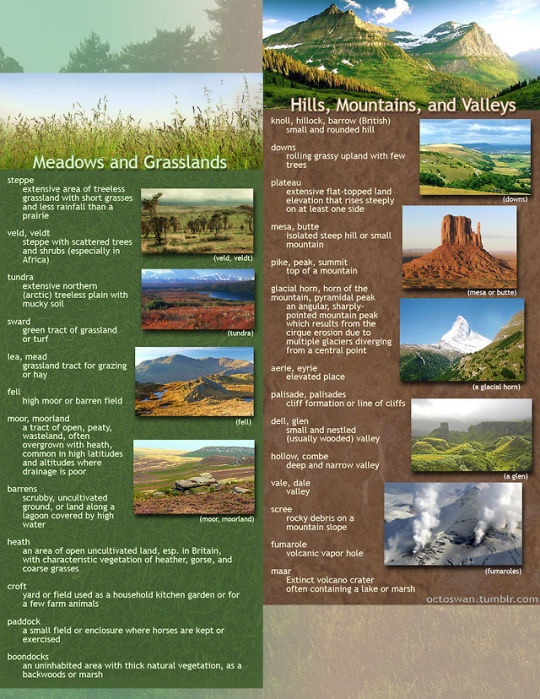

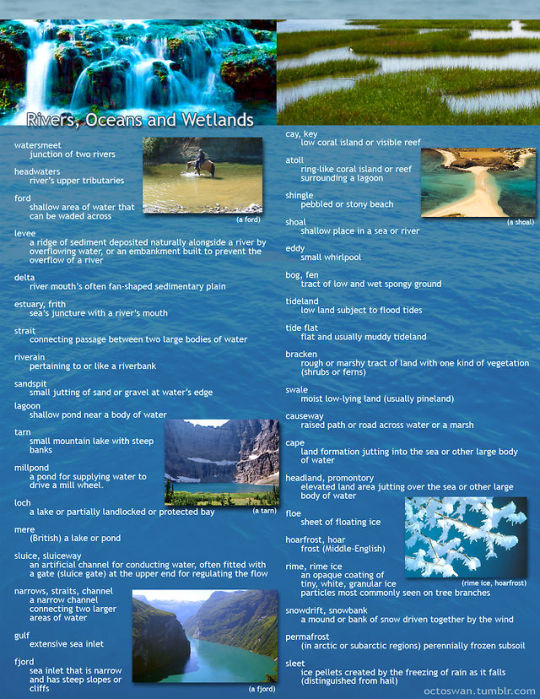
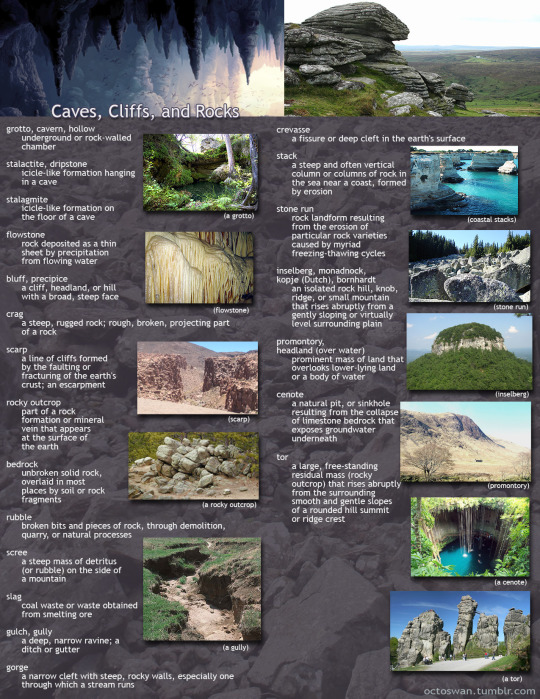
I made these as a way to compile all the geographical vocabulary that I thought was useful and interesting for writers. Some descriptors share categories, and some are simplified, but for the most part everything is in its proper place. Not all the words are as useable as others, and some might take tricky wording to pull off, but I hope these prove useful to all you writers out there!
(save the images to zoom in on the pics)
210K notes
·
View notes
Text
Writing Sam and Max’s dialogue, some tips!
Yeah, so I just wanted to get on here and try to talk about how I write Sam and Max. No one asked me to I just kind of felt like sharing.
So the biggest thing that I noticed when reading fanfiction is that a lot of people tend to make Sam more mellow. Essentially they try to make him seem sane compared to Max which yes you can do, but you need to make sure that you keep Sam not seeming mentally stable all the time.
I mean, he literally killed a fast food employee because they didn’t make his food right. Sure he let Max do the torturing to death thing, but he did pull his gun out on him. And he told Max to do it. He also murdered like a hundred people at one time and only said “man I kind of feel bad about this” did we forget that he and Max kept a man locked in their closet until he died? What I’m trying to get at is Sam is not the sane member of the freelance police. He just has some semblance of self-control is well spoken and relatively soft mannered.
Examples of Sam being generally violent
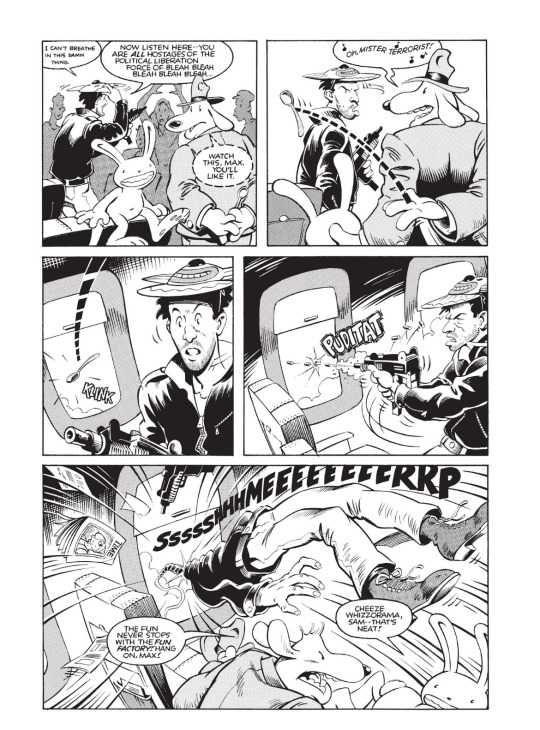
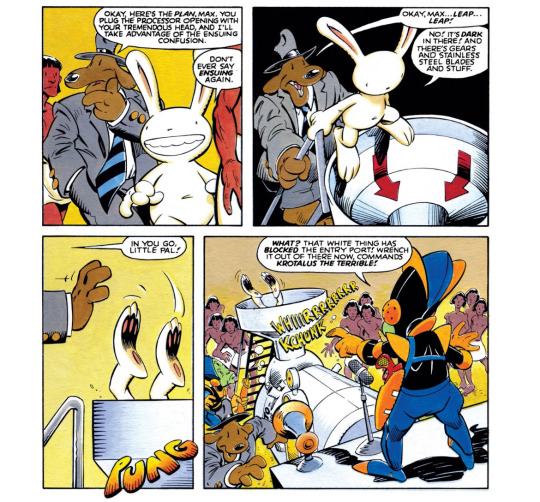
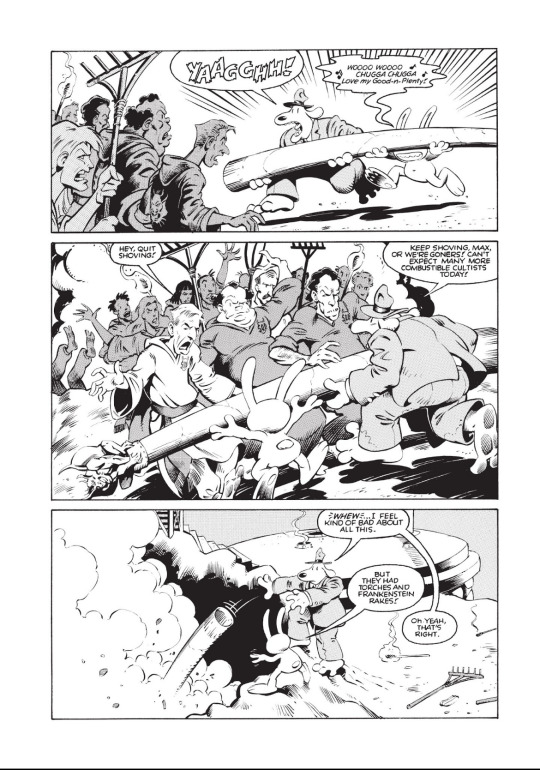
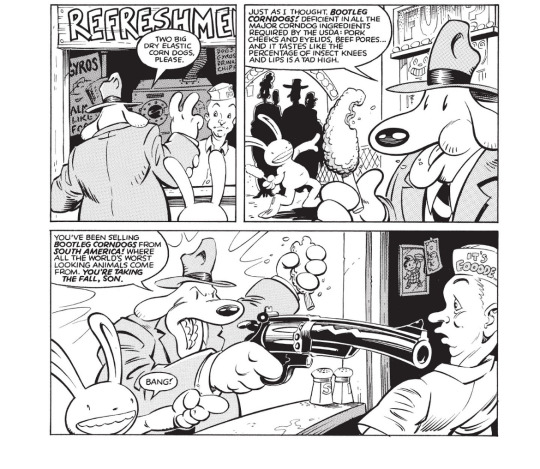
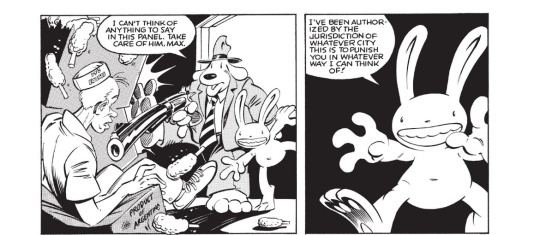
For example, let’s say they’re going to commit murder. Sam might say, “I think I’ll shoot this guy to make him stop talking.” But Max might say “ if I rip out your vocal cords and tie your small intestines around your throat will that keep your trap shut?” The point is Max is more unhinged with what he says but Sam still says the same thing just in a way that makes it come off as more normal. (Compared to max anyway.) they are both violent, but Max comes across as more violent due to the way he says it.
You also have when Max says something batshit insane and Sam just adds on to it.
“Sam, what do you think would happen if I threw Harry Moleman into an industrial frier? His face makes me seethe with anger.”
“Just make sure to throw away oil after, I don’t wanna eat anything that had his body anywhere near it”
My biggest piece of advice when it comes to writing them is just don’t be normal. Sam and Max deeply care about each other. They may show aggression towards each other, but most of the times it’s still in an affectionate manner and neither one of them gets seriously hurt. Sam and Max are unconventional characters so your writing needs to be unconventional as well.
When I write them, the first thing that I do is I read the dialogue and I think to myself “would a well adjusted member of society say this?” if the answer is no, then I’m on the right track. 
And make sure that you’re engaging with a canon media and not just fanon media. It can be really easy to have your perception of a character changed based off of the fanfiction or fan works that you’re reading/engaging with. So making sure that you’re regularly going back to the source material is important . 
OK, I guess that’s all for now. If y’all have any specific questions you want asked about how I write them go ahead. I run an ask blog so if you wanna read what I do to see how I write them then yeah you can do that.
Ask blog -> @freelancepolicedotcom
And just to clarify, you don’t have to write them this way. this is just how I write them and I’m just sharing in case any aspiring writers out there need help with these funny guys. If this helped you write anything, please send them to me I love to read fanfiction. 
#ramble ramble ramble#writing#writing tips#Sam and max#Sam and max freelance police#freelance police#Sam and max fanfiction#writing fanfic#sam and max freelance husbands#samandmax#sam & max
38 notes
·
View notes
Text
Worldbuilding tip: make a fictional society where social norms are based on small personality quirks that you or other real-life people you know have, multiplied outward to apply evenly to a society of ten million people.
For example, if you know someone who expresses friendship through cooking for people, your society could have an unspoken social rule where refusing someone's home cooking is the ultimate faux pas, with foreigners accidentally getting in trouble for politely declining a dinner or a box of food. If you know someone who's really into weight lifting, make it a norm for people to state their lifting stats in casual conversation and have them act baffled when someone just doesn't know what their maximum deadlift is.
Fictional culture shock is one of my favorite little micro-tropes and I want to use more of it in my own writing. I've used it extensively when writing Dungeons and Dragons campaigns and settings, but very little in my audio series.
44 notes
·
View notes
Text
Top 5 writing strengths you can't miss out on.
Target Audience
Everything bellow this point means nothing if your writing doesn’t reach “your kind of people”.
If your words are your career, knowing your readers is beyond important. Selling your story to the right person is the difference between making a living and starving outside.
Your story is a product of entertainment or enlightenment for your reader. If you’re not writing for yourself, you're writing to entertain. And every letter and word is for them, so know them, be with them, and never take your eyes off them.
Powerful writing voice
Your voice is what makes people think, ‘Hey, I know this guy.’
I will never read a paragraph of Charles Dickens and not say, ‘Yep, that’s him.’
You can copy Charles Dickens or Scott Fitzgerald, but it’s always better to find your own voice. It’s more fitting and natural to you than another’s voice. Kind of like choosing your wand versus stealing it from another witch or wizard in Harry Potter.
Heavy vocabulary
It’s not about having a rich vocabulary, because that’s too vague. It’s not about knowing specific keywords because that’s too narrow. It’s about being a walking, talking thesaurus.
A writer, above all others, must know words like: Peregrinate, Limerence, Bumfuzzle, Defenestration, or Quixotic.
It’s not enough to know their meaning. You seek their origin. You become an etymologist.
How do you stockpile words? Memorizing the dictionary from A to Z is a start. If not, read fiction. Why not non-fiction as well? I’ve begun reading journals recently and have found wonderful style, voice, and words within them.
So, take care of wide reading and read twice or thrice more than your non-writer friend.
Varying sentence lengths
Humans are obsessed with change.
Surprise: Your readers are human.
Do you love long sentences like I do? Good, but remember to sandwich some short ones in there every now and then. Perhaps you love short ones? They’re great, but a long sentence wouldn’t be so bad.
Try to vary your breath to keep yourself in check. Take four breaths when writing a short sentence, and exhale for seven thoughtful seconds for longer ones. Use your breath as a pacemaker.
literary devices
I’m going to take a wild guess that you want your stories to be engaging. If so, meet your new best friends: literary devices.
They will help describe your plot, pop out your setting, and build characters to weep and die for. And there's a device for almost all your needs.
There is: Metaphor, simile, litotes, assonance, and alliteration. There’s Foreshadowing, flashback, allegory, and symbolism. And that’s a small mention.
The more you know them and the deeper your familiarity with each device, the more likely you’re to make a master storyteller.
There’s more to writing strengths than these. But they're the most important ones to focus on. I don’t promise literary fame rivaling Cervantes or Melville. I will, however, guarantee that your writing will improve.
Your story will grab more eyes, and maybe you'll have a shot at being recognized for your efforts and creativity.
The question is, are you willing to pay the price of time, blood, and sweat?
Adue, until next time.
#writing#writers on tumblr#writingcommunity#tumblr writers#writerlife#writingjourney#writing tips#creative writing#writingstruggles#writeblr#writing advice#tips and advice#writing life#on writing#writers#fiction writing
26 notes
·
View notes
Text
the last one will forever confuse me on how it makes sense
i am very open to anyone explaining how this works to me. educate me please, tumblr. you’ll probably do a better job than any other english class or professor
Writing Tips
Punctuating Dialogue
✧
➸ “This is a sentence.”
➸ “This is a sentence with a dialogue tag at the end,” she said.
➸ “This,” he said, “is a sentence split by a dialogue tag.”
➸ “This is a sentence,” she said. “This is a new sentence. New sentences are capitalized.”
➸ “This is a sentence followed by an action.” He stood. “They are separate sentences because he did not speak by standing.”
➸ She said, “Use a comma to introduce dialogue. The quote is capitalized when the dialogue tag is at the beginning.”
➸ “Use a comma when a dialogue tag follows a quote,” he said.
“Unless there is a question mark?” she asked.
“Or an exclamation point!” he answered. “The dialogue tag still remains uncapitalized because it’s not truly the end of the sentence.”
➸ “Periods and commas should be inside closing quotations.”
➸ “Hey!” she shouted, “Sometimes exclamation points are inside quotations.”
However, if it’s not dialogue exclamation points can also be “outside”!
➸ “Does this apply to question marks too?” he asked.
If it’s not dialogue, can question marks be “outside”? (Yes, they can.)
➸ “This applies to dashes too. Inside quotations dashes typically express—“
“Interruption” — but there are situations dashes may be outside.
➸ “You’ll notice that exclamation marks, question marks, and dashes do not have a comma after them. Ellipses don’t have a comma after them either…” she said.
➸ “My teacher said, ‘Use single quotation marks when quoting within dialogue.’”
➸ “Use paragraph breaks to indicate a new speaker,” he said.
“The readers will know it’s someone else speaking.”
➸ “If it’s the same speaker but different paragraph, keep the closing quotation off.
“This shows it’s the same character continuing to speak.”
108K notes
·
View notes
Text
Dramatic Confessions to Use in Writing
“I’m in love with you,” “You don’t get to tell me that. Not after what you did.”
“We can’t keep doing this,” “So stop. Leave. I dare you.”
“Do you want me to leave?” “No, I want you to make me stop loving you.”
“Do you love me?” “I don’t know how to.”
“I’m in love with you,” “Then why does it hurt so much?”
“Please don’t leave,” “Why? So we can keep pretending we’re just friends? Friends don’t do this, *name*. I can’t keep convincing myself I’m not in love with you.”
Should I do more?
#writers on tumblr#writing#writerscommunity#writing resources#writing advice#writing tips#writeblr#tips#writing tips and tricks#writing tools#romance#writing romanc#romance books#romantic#confession
30 notes
·
View notes
Text
#17 🌙❤️🤍
argument prompts pt.2
"You aren't allowed back in my house, do you hear me? You do not belong here!"
"You've never had a reason to be mean to me, you just like to see me suffer."
"I don't care. Even if you had the worst day of your life, do not think about taking it out on me."
"You're honestly useless, I don't know what I keep you around for."
"I'm just supposed to forget how you cheated on me with them? So you can go on with life and do it again sometime when you're bored of me?"
"I am a forgiving person...but I have limits like everyone else."
"You know why I left, do not turn this into another fight."
"We have to get along for the rest of the family, can you please be civil with me for once?"
"I've helped you as much as I can, when are you going to do anything to help me?"
"Don't bother coming back, I don't need an idiot ruining my mood."
#dialogue#dialogue prompt#character dialogue#writing dialogue#dialogue inspiration#writing stuff#writing related#writing tips#plotting#writeblr#writing#writers on tumblr#story prompts#prompts#writing prompt#fic prompt#whump prompt#prompt list#writing prompts#writing inspiration#🌙❤️🤍#writing ideas#story ideas#fic ideas#story help
27 notes
·
View notes
Text
One of the key elements that make a story memorable is its characters. Whether they’re heroes or villains, the people we create in our writing need to feel unique, complex, and alive. It was a part of writing that I struggled with the most at the beginning. How do you make sure your characters stand out from the crowd? How do you give them a voice and presence that’s distinct and unforgettable?
Give Them Unique Voices
One of the easiest ways to make your characters feel distinct is to give each of them a unique voice. A character’s way of speaking—the words they use, the rhythm of their sentences, their tone—says a lot about them. A witty, sarcastic character will speak differently from someone who’s more reserved and thoughtful. You can achieve this by paying attention to how they express themselves, not just through dialogue but through their internal monologues as well. A character who’s quick-tempered might use short, sharp sentences, while someone more introspective might speak in longer, more reflective phrases. The key is consistency. Once you establish a character's way of speaking, try to keep it consistent throughout your story.
Focus on Their Backstory and Motivations
Every character is shaped by their past, even if you don’t fully show it on page. A character who grew up in a strict, loving household will behave differently than someone who had to survive in a rough, unpredictable enviromnent. You don’t need to go into every detail, but having a clear sense of where your character came from—and what they want in the present—will help guide how they act in different situations. Their goals, fears, and desires should reflect their decisions and relationships, making them feel more like real.
Give Them Distinct Physical Traits
Physical traits can help differentiate characters, but they should go beyond just eye color or height. Think about how a character’s appearance might reflect their personality or history. Maybe a character with messy hair and old clothes is someone who’s always in a rush or doesn’t care about their appearance. Perhaps a character who is meticulously groomed is someone who values control and order. Little details like this can communicate something about their character without you needing to say much. However, avoid making these physical traits stereotypes—make sure they reflect the essence of your character, not just visual clichés. (for the love of god stay away from the term orbs)
Let Them Have Quirks and Habits
The little things can go a long way in making a character feel real. Does your character always hum a certain tune when they’re nervous? Do they tap their fingers when they’re deep in thought? Maybe they have a habit of checking their phone obsessively, or they’re always keeping an eye of their loved ones around them. These quirks don’t need to be extreme or over-the-top, but they should feel like part of who the character is. Quirks can be small behaviors that reveal something about how the character thinks or feels, adding depth and individuality.
Use Their Relationships to Define Them
A character’s relationships with others play a huge role in how they’re perceived. How a character interacts with their friends, family, and even strangers can say a lot about who they are. Maybe your character is the life of the party with their friends but acts shy and withdrawn around authority. Maybe they’re confrontational and hot-headed with others but soft-spoken when talking to animals. These shifts in behavior show different sides of a character, making them feel more distinct. Additionally, relationships are often the best way to highlight a character’s growth—how they change based on their experiences with others can make them more dynamic and engaging.
Give Them Flaws and Vulnerabilities
No one is perfect, and neither should your characters be. Flaws and vulnerabilities not only make your characters feel more human but also give them room to grow throughout the story. Maybe your character is overly self-critical, or they struggle with trust issues. Perhaps they have a tendency to lie to protect themselves or they’re stubborn to a fault. These imperfections make characters relatable and provide opportunities for conflict and development. Flaws also allow you to play with how characters change over time. Do they learn to overcome their weaknesses? Do their flaws lead to their downfall? It’s up to you, but either way, giving your characters room to grow through their flaws adds another layer to their distinctiveness.
Avoid Making Them Too Predictable
While consistency in character traits is important, it’s also crucial to avoid making your characters so predictable that they feel boring. People are complex, and so should your characters be. Let them surprise readers by acting in unexpected ways. Maybe your tough, no-nonsense character suddenly shows kindness to someone they barely know, or a seemingly shy character makes a bold move when it matters most. These moments of complexity help break the mold and keep readers engaged.
These are just a few tips of mine for writing characters. Hope they help! :)
#writers on tumblr#blog#creative writing#writing tips#writers#writeblr#writers and poets#writerscommunity#writer stuff#writer problems
21 notes
·
View notes
Text
Group scenes are chaos - I usually can sort it out in my brain while everything is unfolding at the same time, but sometimes I divide it into tiny separate scenes all happening at once, sometimes interacting a little, and sometimes a lot.
Tips from a Beta Reading Writer
This one's for the scenes with multiple characters, and you're not sure how to keep everyone involved.
Writing group scenes is chaos. Someone’s talking, someone’s interrupting, someone’s zoning out thinking about breadsticks. And if you’re not careful, half your cast fades into the background like NPCs in a video game. I used to struggle with this so much—my characters would just exist in the scene without actually affecting it. But here’s what I've learned and have started implementing:
✨ Give everyone a job in the scene ✨
Not their literal job—like, not everyone needs to be solving a crime or casting spells. I mean: Why are they in this moment? What’s their role in the conversation?
My favourite examples are:
The Driver: Moves the convo forward. They have an agenda, they’re pushing the action.
The Instigator: Pokes the bear. Asks the messy questions. Stirring the pot like a chef on a mission.
The Voice of Reason: "Guys, maybe we don’t commit arson today?"
The Distracted One: Completely in their own world. Tuning out, doodling on a napkin, thinking about their ex.
The Observer: Not saying much, but noticing everything. (Quiet characters still have presence!)
The Wild Card: Who knows what they’ll do? Certainly not them. Probably about to make things worse.
If a character has no function, they’ll disappear. Give them something—even if it’s just a side comment, a reaction, or stealing fries off someone’s plate. Keep them interesting, and your readers will stay interested too.
7K notes
·
View notes